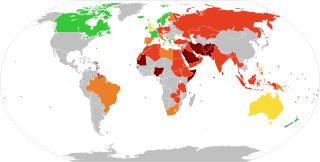A hate crime is crime where a perpetrator targets a victim because of their physical appearance or perceived membership of a certain social group.
Hate speech is a legal term with varied meaning. It has no single, consistent definition. It is defined by the Cambridge Dictionary as "public speech that expresses hate or encourages violence towards a person or group based on something such as race, religion, sex, or sexual orientation". The Encyclopedia of the American Constitution states that hate speech is "usually thought to include communications of animosity or disparagement of an individual or a group on account of a group characteristic such as race, color, national origin, sex, disability, religion, or sexual orientation". There is no single definition of what constitutes "hate" or "disparagement". According to Alexander Brown, the term "hate speech" is ambiguous and carries "a multiplicity of different meanings". Legal definitions of hate speech vary from country to country.

Ernst Christof Friedrich Zündel was a German neo-Nazi publisher and pamphleteer of Holocaust denial literature. He was jailed several times: in Canada for publishing literature "likely to incite hatred against an identifiable group", and on charges of being a threat to national security; in the United States, for overstaying his visa; and in Germany for charges of "inciting racial hatred". He lived in Canada from 1958 to 2000.
Sedition is overt conduct, such as speech or organization, that tends toward rebellion against the established order. Sedition often includes subversion of a constitution and incitement of discontent toward, or insurrection against, established authority. Sedition may include any commotion, though not aimed at direct and open violence against the laws. Seditious words in writing are seditious libel. A seditionist is one who engages in or promotes the interest of sedition.
Strafgesetzbuch, abbreviated to StGB, is the German penal code.
Abortion in Germany during the first 12 weeks of pregnancy will not be punished under the law if the condition of mandatory counseling is fulfilled. The same goes later in pregnancy in cases that the pregnancy poses an important danger to the physical or mental health of the pregnant woman. In the case that the abortion is because of a rape mandatory counseling is not mandatory. The woman needs to receive counseling, called Schwangerschaftskonfliktberatung, at least three days prior to the abortion and must take place at a state-approved centre, which afterwards gives the applicant a Beratungsschein.
Germar Rudolf, also known as Germar Scheerer, is a German chemist and a convicted Holocaust denier.
Incitement to ethnic or racial hatred is a crime under the laws of several countries.
The Federal Republic of Germany guarantees freedom of speech, expression, and opinion to its citizens as per Article 5 of the constitution. Despite this, censorship of various materials has taken place since the Allied occupation after World War II and continues to take place in Germany in various forms due to a limiting provision in Article 5, Paragraph 2 of the constitution. In 2014 the Reporters Without Borders Press Freedom Index ranked Germany as 14th in the world in terms of press freedom. During the Allied occupation of Germany, the media was controlled by the occupying forces. The policy rationales differed among the occupying powers, but there was resentment in literary and journalistic circles in many parts of the country. Undesired publishing efforts were unilaterally blocked by the occupying forces.

Between 1941 and 1945, Nazi Germany perpetrated the Holocaust: a large-scale genocidal campaign in which approximately six million European Jews were systematically murdered throughout German-occupied Europe. Since World War II, several countries have criminalised Holocaust denial—the assertion by antisemites that the genocide was a myth, fabrication or exaggeration. Currently, 17 European countries, along with Israel and Canada, have laws in place that cover Holocaust denial as a punishable offence. Many countries also have broader laws that criminalise genocide denial, including that of the Holocaust. Among the countries that have banned Holocaust denial, Russia, Austria, Germany, Hungary, Poland, and Romania have also banned Nazi symbols. Any expression of genocide justification is also a criminal offence in several countries, as is any attempt to portray Nazism in a positive light.

Freedom of speech is the concept of the inherent human right to voice one's opinion publicly without fear of censorship or punishment. "Speech" is not limited to public speaking and is generally taken to include other forms of expression. The right is preserved in the United Nations Universal Declaration of Human Rights and is granted formal recognition by the laws of most nations. Nonetheless, the degree to which the right is upheld in practice varies greatly from one nation to another. In many nations, particularly those with authoritarian forms of government, overt government censorship is enforced. Censorship has also been claimed to occur in other forms and there are different approaches to issues such as hate speech, obscenity, and defamation laws.
Speech crimes are certain kinds of speech that are criminalized by promulgated laws or rules. Criminal speech is a direct preemptive restriction on freedom of speech, and the broader concept of freedom of expression.

A blasphemy law is a law prohibiting blasphemy, which is the act of insulting or showing contempt or lack of reverence to a deity, or sacred objects, or toward something considered sacred or inviolable. According to Pew Research Center, about a quarter of the world's countries and territories (26%) had anti-blasphemy laws or policies as of 2014.
The use of flags, emblems and anthems of Nazi Germany (1933–1945) is currently subject to legal restrictions in a number of countries, such as Austria, Brazil, Czech Republic, France, Germany, Hungary, Israel, Poland, Russia, Ukraine and other countries.
The hate speech laws in Australia give redress to someone who is the victim of discrimination, vilification, or injury on grounds that differ from one jurisdiction to another. All Australian jurisdictions give redress when a person is victimised on account of colour, ethnicity, national origin, or race. Some jurisdictions give redress when a person is victimised on account of colour, ethnic origin, religion, disability, gender identity, HIV/AIDS status or sexual orientation.
The hate speech laws in Poland derive from its Constitution and from its Penal Code. The laws discourage any conduct that foments racial, national, or sectarian hatred. The laws punish those who intentionally offend the feelings of the religious, e.g. by disturbing services or creating public calumny. They also prohibit public expression that insults a person or a group on account of national, ethnic, racial, or religious affiliation or the lack of a religious affiliation.
The hate speech laws in France are matters of both civil law and criminal law. Those laws protect individuals and groups from being defamed or insulted because they belong or do not belong, in fact or in fancy, to an ethnicity, a nation, a race, a religion, a sex, a sexual orientation, or a gender identity or because they have a handicap. The laws forbid any communication which is intended to incite discrimination against, hatred of, or harm to, anyone because of his belonging or not belonging, in fact or in fancy, to an ethnicity, a nation, a race, a religion, a sex, a sexual orientation, or a gender identity, or because he or she has a handicap.

An Act to amend the Canadian Human Rights Act and the Criminal Code is a law passed in 2017 by the Parliament of Canada. It was introduced as Bill C-16 of the first session of the 42nd Parliament. The law adds gender expression and gender identity as protected grounds to the Canadian Human Rights Act, and also to the Criminal Code provisions dealing with hate propaganda, incitement to genocide, and aggravating factors in sentencing.
Hate speech in the United States cannot be directly regulated by the government due to the fundamental right to freedom of speech protected by the Constitution. While "hate speech" is not a legal term in the United States, the U.S. Supreme Court has repeatedly ruled that most of what would qualify as hate speech in other western countries is legally protected speech under the First Amendment. In a Supreme Court case on the issue, Matal v. Tam (2017), the justices unanimously reaffirmed that there is effectively no "hate speech" exception to the free speech rights protected by the First Amendment and that the U.S. government may not discriminate against speech on the basis of the speaker's viewpoint.
Hate speech is public speech that expresses hate or encourages violence towards a person or group based on something such as race, religion, sex, or sexual orientation. Hate speech is "usually thought to include communications of animosity or disparagement of an individual or a group on account of a group characteristic such as race, colour, national origin, sex, disability, religion, or sexual orientation".




